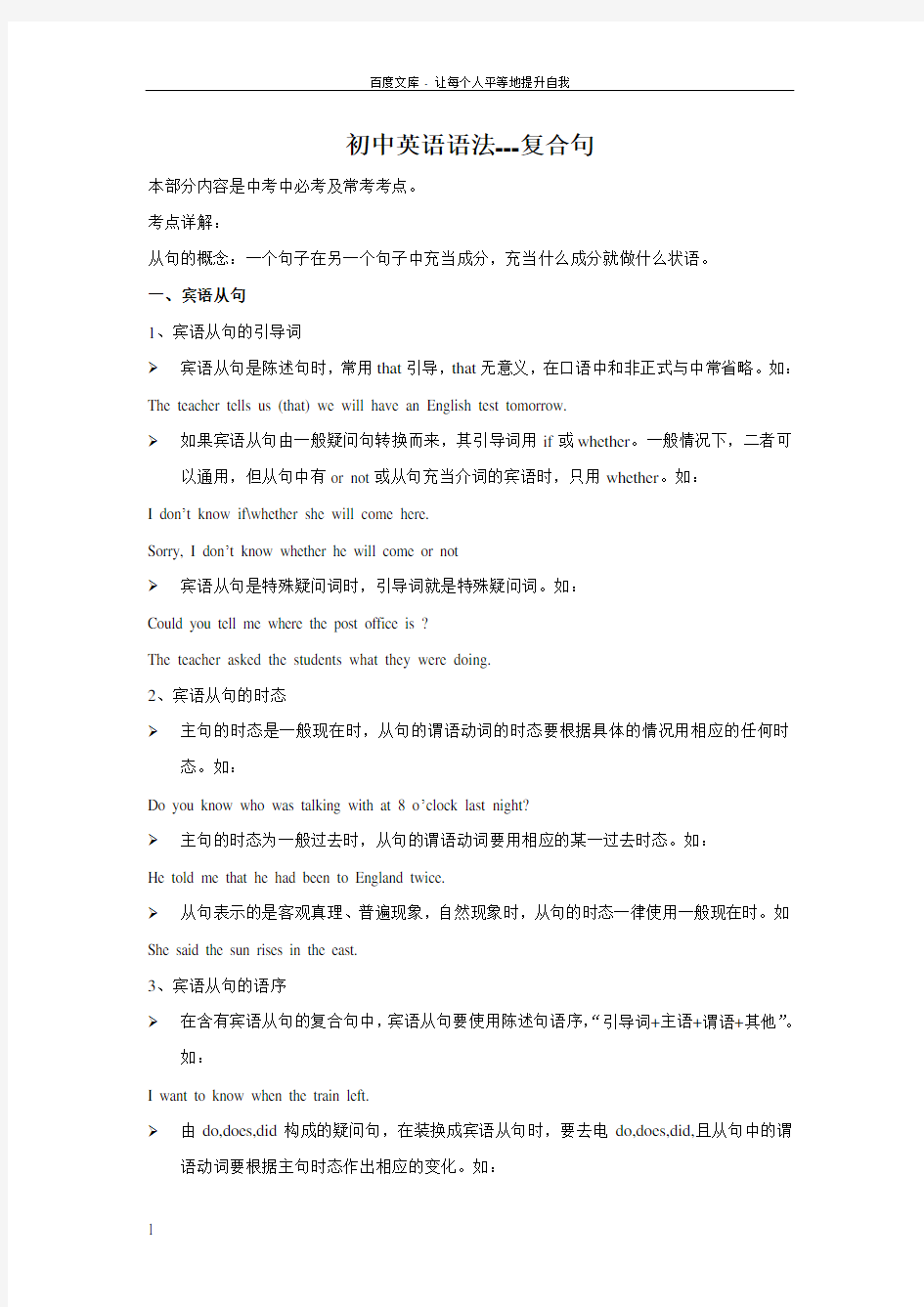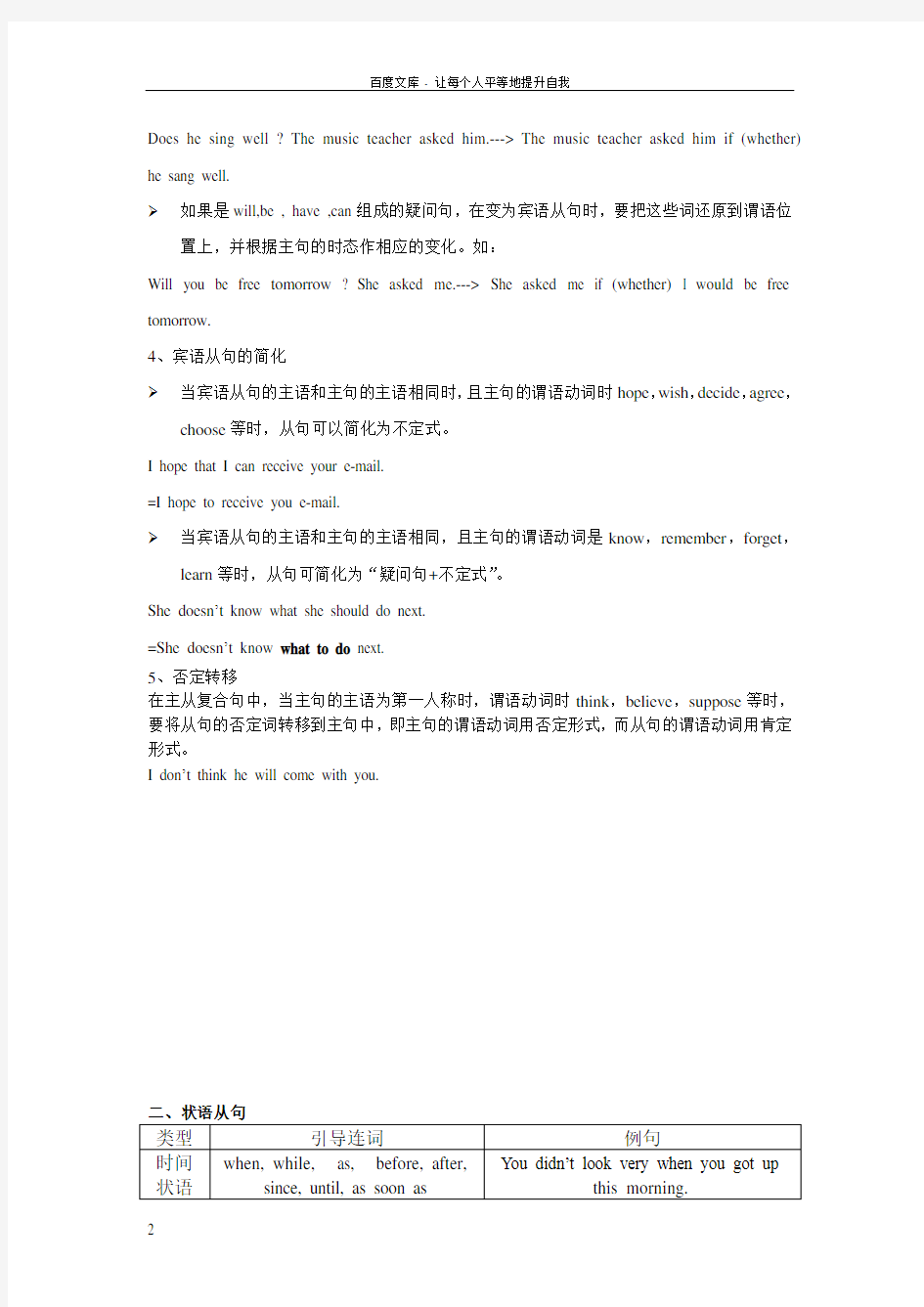

初中英语语法---复合句
本部分内容是中考中必考及常考考点。
考点详解:
从句的概念:一个句子在另一个句子中充当成分,充当什么成分就做什么状语。
一、宾语从句
1、宾语从句的引导词
?宾语从句是陈述句时,常用that引导,that无意义,在口语中和非正式与中常省略。如:The teacher tells us (that) we will have an English test tomorrow.
?如果宾语从句由一般疑问句转换而来,其引导词用if或whether。一般情况下,二者可以通用,但从句中有or not或从句充当介词的宾语时,只用whether。如:
I don’t know if\whether she will come here.
Sorry, I don’t know whether he will come or not
?宾语从句是特殊疑问词时,引导词就是特殊疑问词。如:
Could you tell me where the post office is ?
The teacher asked the students what they were doing.
2、宾语从句的时态
?主句的时态是一般现在时,从句的谓语动词的时态要根据具体的情况用相应的任何时态。如:
Do you know who was talking with at 8 o’clock last night?
?主句的时态为一般过去时,从句的谓语动词要用相应的某一过去时态。如:
He told me that he had been to England twice.
?从句表示的是客观真理、普遍现象,自然现象时,从句的时态一律使用一般现在时。如She said the sun rises in the east.
3、宾语从句的语序
?在含有宾语从句的复合句中,宾语从句要使用陈述句语序,“引导词+主语+谓语+其他”。
如:
I want to know when the train left.
?由do,does,did构成的疑问句,在装换成宾语从句时,要去电do,does,did,且从句中的谓语动词要根据主句时态作出相应的变化。如:
Does he sing well ? The music teacher asked him.---> The music teacher asked him if (whether) he sang well.
?如果是will,be , have ,can组成的疑问句,在变为宾语从句时,要把这些词还原到谓语位置上,并根据主句的时态作相应的变化。如:
Will you be free tomorrow ? She asked me.---> She asked me if (whether) I would be free tomorrow.
4、宾语从句的简化
?当宾语从句的主语和主句的主语相同时,且主句的谓语动词时hope,wish,decide,agree,choose等时,从句可以简化为不定式。
I hope that I can receive your e-mail.
=I hope to receive you e-mail.
?当宾语从句的主语和主句的主语相同,且主句的谓语动词是know,remember,forget,learn等时,从句可简化为“疑问句+不定式”。
She doesn’t know what she should do next.
=She doesn’t know what to do next.
5、否定转移
在主从复合句中,当主句的主语为第一人称时,谓语动词时think,believe,suppose等时,要将从句的否定词转移到主句中,即主句的谓语动词用否定形式,而从句的谓语动词用肯定形式。
I don’t think he will come with you.
时间状语从句
(1)当主句是一般将来时态或祈使句,表示将来的意义时,从句通常用一般将来时,简称“主将从现”。如:
I’ll ring you as soon as I get up.
(2)when 引导的时间状语从句,通常表示主句和从句的动作同时发生;before表示主句的动作发生在从句之前;after则表示主句的动作发生在从句之后;as引导的时间状语从句,往往表示主句和从句的动作同时发生,不分先后。
(3)until和till引导的时间状语从句。
①主句的谓语动词是延续性动词时,主句用肯定形式,表示这一动作或状态一直延续到until\till所表示的时间为止。如:
I’ll wait for you till you come to see me.
②主句的谓语动词时非延续性动词时,用否定形式表示主句的动作直到until所表示的时间才发生。构成句式not...until, 有时不用not,而用其他如never,nothing等表示否定意义的词。如:
I didn’t go to bed until I finished my homework.
(4)since引导的时间状语从句,表示“自.....以来”,主句用一般现在时或现在完
成时,从句用一般过去时。机构为:It has been...since+从句\It is ....since+从句。如:
I have worked in this school since I graduated from Beijing University.
It is 10 years since I began to study English.
条件状语从句
(1)主句为一般将来时,从句用一般现在时。如:
I’ll visit the Great Wall if it doesn’t rain tomorrow.
(2)如果if引导的条件状语从句所表示的前提或条件将来可以实现或正在进行,从句要用现在完成时或进行时,主句通常用将来时。如:
We will give you a good price if you are thinking of buying it.
(3)”祈使句+and\or+陈述句”中,祈使句在意义上相当于一个条件状语从句。如:Use your head, and you’ll find a way.
=If you use your head ,you’ll find a way.
原因状语从句
(1)原因状语从句通常用because、since、as引导。这三个词所表示的语气依次减弱,用why提问用because来回答。如:
I did that because she told me .
(2)如果状语从句所表示的原因是人们已知的事实,就要用since,而不用as或because。Since在这里的意思是“既然”。如:
Since you can’t answer the question, you can ask someone for help.
目的状语从句
(1)引导目的状语从句的词或词组有so that,in order that等,谓语中常含有may,might,can,could,will,would等情态动词。如:
He must get up early so that he can go to work on time.
(2)当从句主语与主句主语一致时,可用so as to, in order to .如:
He worked day and night in order that he could succeed.